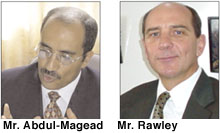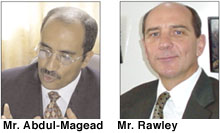
Helping Yemen fight poverty UN and donors offer loans to help micro-businesses [Archives:2003/09/Business & Economy]
February 3 2003
BY ABDUH M. ASSABRI
YEMEN TIMES STAFF
[email protected]
The second phase of Yemen’s micro-financing project was signed Feb. 24 with total financing of $2.63 million over the next three years.
The UNDP contribution is $537,908 while $800,000 comes from the Netherlands, $100,000 from the government of Yemen, plus parallel financing of $1.2 million from the Social Fund for Development (SDF).
The project is expected to start in March and last to 2005.
Micro financing is one of the most important poverty alleviation programs led by UNDP and the government of Yemen.

“The UNDP has been working very closely with the government of Yemen, the Ministry of Labor & Social Affairs and also very closely with the our partners, the Netherlands government and the World Bank,” said James Rawely, UN resident co-ordinator for development in Yemen.
This project is a follow-up of the 1st phrase of micro-financing initiative under Yemen’s poverty alleviation and employment generation program.
“Over the last few years to introduce a model of micro-finance in Yemen, the 1st Phase of our support which began roughly two years ago, and is finishing now, was targeted to transforming non-governmental organizations into micro-finance institutions through directly providing assistance to the poor in urban areas, particularly women,” said Rawley.
The second phase will provide a tailored package of technical assistance funding to three high-performing micro-financing institutions, to help them meet their intermediate growth and transformation objectives.
The UN capital development fund will provide technical backstopping to the project.
“This is very important because it is directly benefiting the lives of the poor people. But the very important aspect of this program is not just directly reaching the poor, but building up the institutional capacity,” he noted further.
The third dimension of this program is to work with the policy level.
“For us we really want to maximize the potential impact of the program. We want to review with the government’s policies and areas of micro-finance and make sure that the government policies are very conducive to extend micro-finance to the population,” he said.
So those three levels, the people level, the institutional level and the policy level are to be carried during Phase 2.
During the 1st Phase for collaboration, the total amount reached $1.2 million.
The main objectives of the UNDP is to benefit poor people, build up the capacity of four NGOs and improve the policy environment in Yemen.
“If we are able to achieve that, I think the UNDP will be able to exit from this area and allow external donors such as, the German government and the World Bank, which have much more resources than we do, take full advantage of the combined years of experiences between Phase 1 and 2,” Rawley said.
Khaled Abdol-Magead, the UNDP Program Associate and micro-start project supervisor indicated that the micro-start project was adopted by the United Nations Capital Development Fund, (UNCDF) which focuses on the developmental issues.
About 25 countries depend on the UN’s micro-start project.
It was supposed to start in 1998, but for a number of reasons, the project was postponed to 2000,” Khaled said.
Thorough experiences of countries, loans which are ranging from $ 1000 to $2000 have caused problems, while loans ranging from $50 to $100 are handled better.
Khaled stressed that the project depends on the human factor. Those who have professions can sell their products in the local market without any complications.
“This will prepare the way for employing a large number of unemployed working classes along with training them directly or indirectly and encouraging them to direct their capitals towards productive-related issues,” he noted.
The UNDP aims at introducing new concepts to help local institutions, whether governmental or non-governmental, in order to be able to apply the concept of the micro projects properly.
The UNDP’s main task is not to conduct field work.
Its main task as Khaled indicated is to grant financial and technical support along with raising awareness of the significance of those programs.
The UNDP’s work involves the Women Association for Sustainable Development, the Islah Charitable Society, and the Social Organization for Family Development.
The Yemeni Women’s Union in Taiz led to a breakaway of the micro finance unit, which now as an independent project.
The beneficiaries during the previous phase didn’t exceed 3,000 people, but now the number has reached 8775.
In the present time, we are working with 4,000 people in the micro-start loan project.
This experience is considered to be one of the pioneering experiences in poverty alleviation among the poor and the needy.
The document was signed by HE Vice Minister of planning & Development Abdul Rahman Tarmoom on behalf of the government of Yemen; HE. Dr. AbdulKarim Al-Arhabi, on behalf of the Ministry of Labor and Social Affairs, Rawley on behalf of UNDP, and B. J.. Ronhaar on behalf of the Royal Netherlands Embassy in Sana’a.
——
[archive-e:09-v:2003-y:2003-d:2003-02-03-p:./2003/iss09/b&e.htm]


